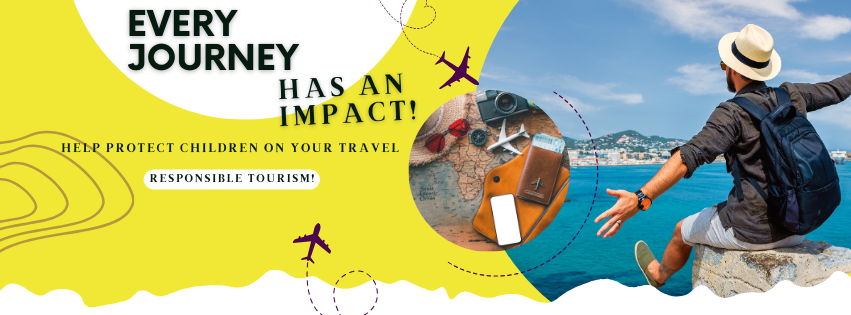
Information and Tips for Traveller and Tourists
Our actions impact the lives of children no matter where we travel.
Travel better – be a responsible and ethical traveller!
Travelers play a vital role in preventing child exploitation, especially in destinations where risks are higher.
Here are some tips for travelers to engage in ethical travel and help protect children:
1. Choose responsible business and service providers.
Choose tour operators, hotels and other service providers committed to child protection, like members of The Code. Avoid companies that use children as tourist attractions or in activities they shouldn’t be involved in.
To learn more about the companies you can always ask for information at info@thecode.org.
2. Avoid short-term, unskilled voluntourism activities with children and don’t engage in orphanage tourism.
Always do your research before volunteering abroad, especially if the activities are related to work with children . Our actions impact the lives of children no matter where we travel.
Here are more tips about responsible volunteering
and about voluntourism (what it is, and what is a responsible volunteering/voluntourism)
3. Avoid giving money directly to children.
Giving money, food, or gifts directly to children can encourage begging and may lead to exploitation. Instead, support reputable local organisations and NGOs that work on child protection and support local communities.
4. Be mindful with taking photos.
Ask permission of parents/legal guardians of the children and children themselves before taking any photos of children and avoid sharing their images online, especially in identifiable contexts. Unknowingly, you could contribute to risks of online exploitation.
5. Stay informed about local laws.
Educate yourself on child protection laws in your destination country.
To learn more about countries explore
Being aware helps you act responsibly.
Don’t engage in sexual activity with anyone under the age of 18 years. As per UN Convention on the Rights of the Child: “a child is every human being below the age of eighteen years” – children need to be protected from all forms of violence and exploitation.
6. Report suspected abuse or exploitation.
Familiarise yourself with hotlines or organisations that can help you to report suspected exploitation and abuse of children. When reporting, trust your instincts — if something doesn’t seem right, report it.
More information on where and how to report:
https://dontlookaway.report/*
https://home.crin.org/child-helplines-a-global-list
ECPAT members
*Important: “The website is managed by Defence for Children – ECPAT Netherlands that ensures effective implementation of the UN Convention on the Rights of the Child at the local, national and international level
7. Educate yourself before you go.
Learning about child protection, ethical tourism, and signs of exploitation of children prepares you to make conscious choices and contribute positively to local communities. To learn more about the issue you can explore the following resources:
8. Encourage other business to join The Code!
Ask business about their responsible practices that protect children from sexual exploitation, abuse, and child labour. Recognise those, that are already making a change. Encourage other business to take action, for example by becoming members of The Code. As a customer, you can influence change for children.
Whether you’re individual traveller or business, we all have a responsibility to protect children.
What is a suspicious situation?
Being able to recognise the signs of sexual exploitation of children is extremely important as it enables you to remain alert and prevent child sexual exploitation from taking place.
Watch out for these signs!
If a child:
- looks concerned or frightened in the company of an adult/adults;
- travels alone; Is being put into a taxi or other vehicle by themselves or with a stranger;
- appears to be under the influence of alcohol or drugs;
- displays inappropriate sexual behaviour;
- dresses inappropriately for their age or for the weather conditions;
- looks uncomfortable or scared or avoids eye contact;
- older child not being permitted to go anywhere
- alone ;
- does not know the purpose of travel;
If an adult:
- travels with a child who does not seem related;
- is not able to present identification or a guardian’s permission for a child;
- interacts with vulnerable or unknown children;
- displays sexual behavior towards a child;
- takes many pictures of children, for example at the beach or a pool;
Or:
The interaction between the adult and child does not seem natural and caring;
Common sense is often the best guide for recognising the sexual exploitation of a child. Trust your gut feeling when you observe a situation that seems inappropriate or suspicious.
Why to report?
All children, including teenagers, must be protected from sexual exploitation.
Any suspicious and exploitative situation needs to be reported, regardless of the age of non-exploitative sexual consent in a given country.

